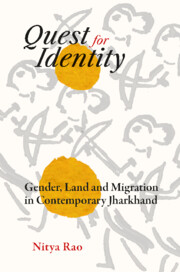8 - Displacing Gender from Displacement: A View from the Santal Parganas
Published online by Cambridge University Press: 26 July 2023
Summary
Introduction
Out of the millions uprooted from their habitats involuntarily or otherwise deprived of their livelihood due to development initiatives in post-independent India, the worst affected have been the Scheduled Tribes (STs), or adivasis. They make up about 40 per cent of the displaced even though they account for only 8 per cent of India's total population (Fernandes and Thukral, 1989). The displacement of adivasis from their land is neither a new phenomenon nor is it solely due to infrastructure projects. As we demonstrate in this chapter, with changes in land systems and agrarian relations, adivasis have historically been the losers and have had to migrate to other locations. As outlined by Rebbapragada and Kalluri (2009), the alienation of adivasi land to non-adivasi traders and moneylenders has been a slow and ongoing process. Thus, forced displacement due to infrastructure projects needs analysing along with slower processes of displacement, often considered to be ‘voluntary’ processes of out-migration.
This chapter, based on extensive fieldwork in Dumka district in 1996–97, 1999–2000 and 2003, explores the gendered implications of different types of displacement on the Santals comprising 40 per cent of the population of Dumka district, Santal Parganas. Displacement is examined historically, specifically pointing to the implications of displacement on gendered roles and spaces. The analysis takes into account the spatial patterning of resources and their management, the temporal and historical dynamics of land use and livelihood systems, and the gendered relationships between micro and macro processes (McDowell, 2002).
This longitudinal view of gender and displacement, which links macro and micro perspectives, can contribute to development planning and displacement debates. This is because infrastructure development is often ‘project’ focused and geared towards macro-economic growth. Local micro-factors such as household-level assets and livelihood strategies, levels of education and human capacity or the village-level power distribution are rarely considered, leave alone integrating the project into comprehensive area development plans. An important consequence of this ‘project’ fixation is that once a project is announced and certain areas demarcated, all developmental activities (such as income generation activities and the provision of basic services) come to a halt, sometimes even before land acquisition. The processes of land acquisition and relocation take years to complete, but the populations are deprived of livelihood activities and basic infrastructure in the interim.
- Type
- Chapter
- Information
- Quest for IdentityGender, Land and Migration in Contemporary Jharkhand, pp. 203 - 228Publisher: Cambridge University PressPrint publication year: 2024



